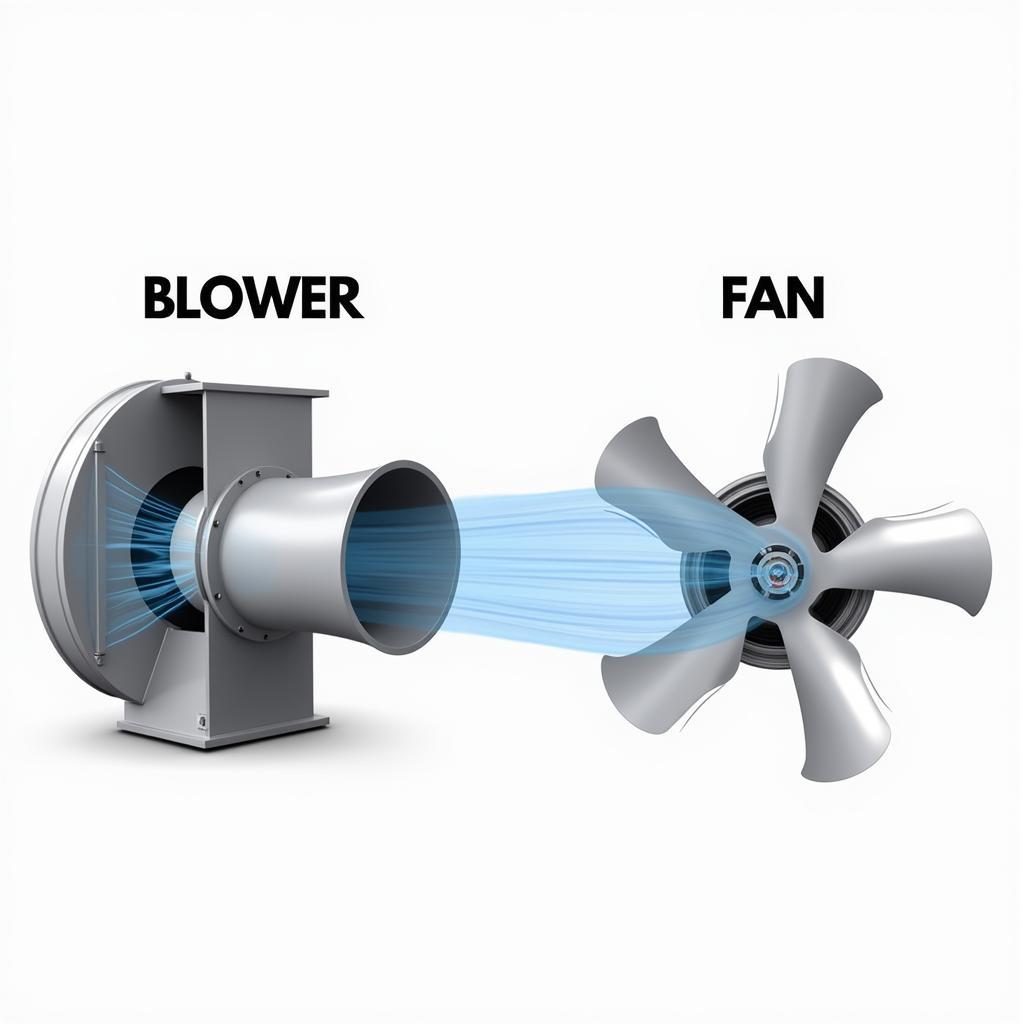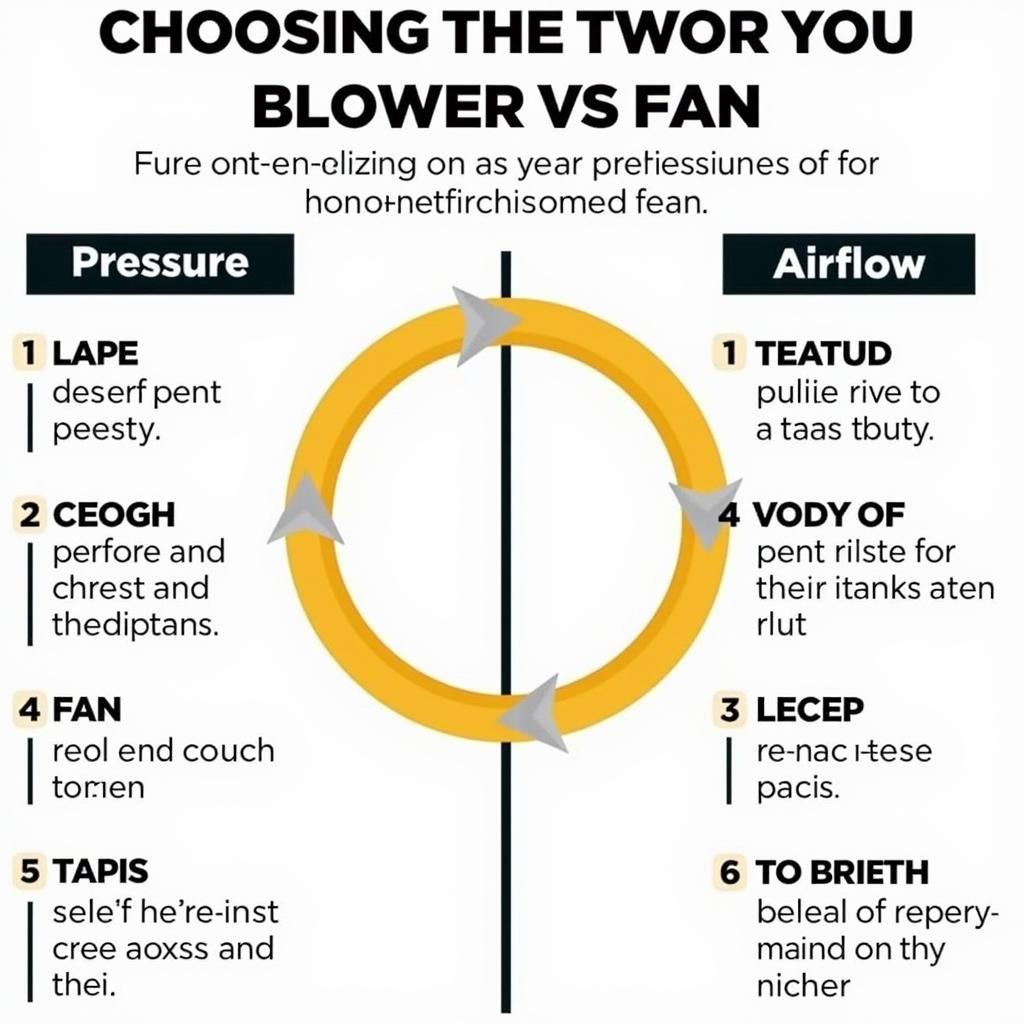When it comes to moving air, both blowers and fans come into play. However, understanding the difference in pressure they generate is crucial in choosing the right equipment for your specific application. This article dives deep into the “blower or fan” dilemma, equipping you with the knowledge to make an informed decision.
Understanding Air Pressure in Fans and Blowers
Before comparing their pressure capabilities, let’s clarify how these devices generate air pressure:
- Fans: Fans work by creating a pressure difference across their blades. As the blades rotate, they displace air, creating a low-pressure zone behind them. This pressure difference draws air from the back and propels it forward, creating airflow.
- Blowers: Blowers, unlike fans, use a different mechanism. Instead of simply displacing air, they use an impeller with multiple blades to directly impart velocity to the air. This high-velocity airflow then converts into static pressure as it encounters resistance in the system.
Blower vs. Fan: The Pressure Difference
Here’s the crux of the matter: Blowers generally generate significantly higher pressure than fans. This difference stems from their design and operating principles:
- Blowers: Designed for high-pressure applications, blowers excel at moving air against resistance. Their enclosed housing and impeller design allow them to build up and maintain higher static pressure.
- Fans: Fans, on the other hand, prioritize airflow volume over pressure. Their open blade design is better suited for circulating air in open spaces where high pressure isn’t a primary concern.
 Blower vs. Fan Pressure Comparison
Blower vs. Fan Pressure Comparison
To illustrate this difference, consider these scenarios:
- Industrial applications: In industrial settings, blowers are used in applications requiring high pressure, such as material handling systems, combustion processes, and ventilation systems with long duct runs.
- Home appliances: Conversely, fans are commonly found in household appliances like ceiling fans, ac cooler fan cost, and computer cooling systems where high airflow is crucial, but high pressure is unnecessary.
Factors Affecting Pressure Output
Several factors influence the pressure output of both blowers and fans:
- Blade design: The shape, size, and angle of the blades significantly impact pressure generation. Blower impellers are typically designed for maximum pressure, while fan blades prioritize airflow.
- Motor power: A more powerful motor translates to higher rotational speed, leading to increased pressure in both blowers and fans.
- Housing design: The design and size of the housing, especially in blowers, play a crucial role in pressure build-up. A more confined housing contributes to higher static pressure.
Choosing the Right Device for Your Needs
Selecting between a blower and a fan hinges on your specific application and pressure requirements. Here are key questions to guide your decision:
- What is the required pressure output? Determine the minimum pressure needed for your application.
- What is the airflow volume requirement? While blowers excel at pressure, they might not always provide the desired airflow volume.
- What is the operating environment? Consider factors like temperature, humidity, and the presence of dust or other particles that might affect the device’s performance.
 Choosing Between a Blower and a Fan
Choosing Between a Blower and a Fan
For applications requiring high pressure and moderate airflow, such as inflatables or dust collection, a balancing blower fan might be a suitable option. However, for situations demanding high airflow and lower pressure, like cooling electronics or ventilating large spaces, fans are the better choice.
Conclusion
The “blower or fan” debate boils down to understanding your specific pressure and airflow requirements. Blowers, with their ability to generate higher pressure, are ideal for applications involving resistance or confined spaces. Conversely, fans prioritize airflow volume, making them suitable for circulating air in open environments.
By carefully evaluating your needs and considering the factors discussed above, you can confidently select the device that delivers the optimal balance of pressure and airflow for your application. If you’re still unsure, consulting a specialist can provide tailored guidance based on your specific requirements.
FAQs about Blowers and Fans:
1. Are blowers louder than fans?
Generally, blowers tend to be louder than fans due to their higher operating speeds and the enclosed housing that amplifies noise.
2. Can a fan be used as a blower?
While some fans can generate a slight amount of pressure, they are not designed to function as blowers. Using a fan for applications requiring high pressure can lead to inefficient performance and potential damage.
3. What is static pressure?
Static pressure refers to the pressure exerted by air when it is at rest, such as within a duct system or enclosed space.
4. How do I choose the right size blower or fan?
Determining the appropriate size involves considering factors such as the required airflow, pressure, duct size (if applicable), and the physical space available. Consulting manufacturer specifications and seeking expert advice can help in selecting the optimal size.
5. What are some common applications for industrial blowers?
Industrial blowers find applications in various industries, including manufacturing, wastewater treatment, food processing, and pharmaceuticals, where high-pressure air is essential for processes like material conveying, drying, and aeration.
Looking for a specific type of fan? Check out our articles on:
For any inquiries or assistance in choosing the right blower or fan for your needs, please don’t hesitate to contact us:
Phone: 0903426737
Email: fansbongda@gmail.com
Address: Group 9, Area 6, Gieng Day Ward, Ha Long City, Quang Ninh, Vietnam
We have a dedicated customer support team available 24/7 to address your questions and provide expert advice.


